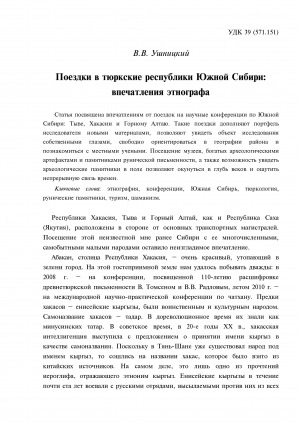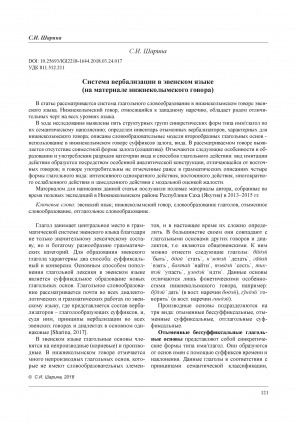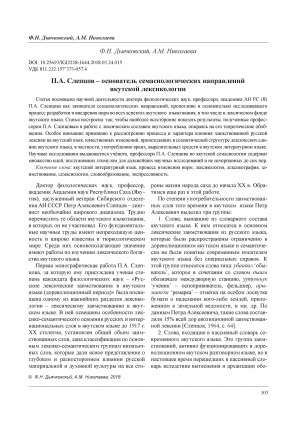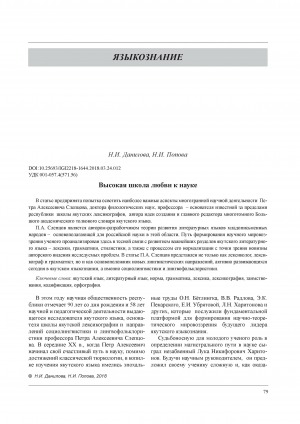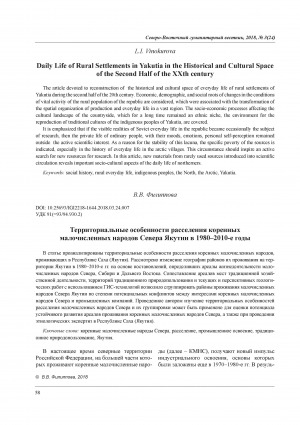Образован в 2008 г. путем слияния Института гуманитарных исследований и Института проблем малочисленных народов Севера СО РАН. Основная цель работы - сохранение и развитие национальной (этнической) самобытности и культурного наследия коренных народов Якутии.
Количество страниц: 10 с.
The relevance of the topic is due to the need for a systematic study of the character series of the Yakut epic olonkho, including previously unstudied mythological images. The article for the first time examines the images of the hero's heavenly patrons in five olonkho texts about the Nyurgun heroes, representing various epic traditions of Central Yakutia. The purpose of the article is to study the images of the hero's heavenly patrons in the context of the figurative system of the olonkho about the Nyurguns, to clarify their role and functions in the plot structure. To achieve the goal, the following tasks were set: compiling a systematization of heavenly patrons and identifying their functional features. The study was conducted using comparative-typological and comparative-contrastive methods. Using a systematic approach, an attempt was made to classify the images of heavenly patrons by their characteristics and functioning in the plot structure. As a result of the study, we come to the conclusion that heavenly patrons act as intermediaries between the deities and the main characters - the Nyurgun heroes. They can be classified as heavenly messengers, heavenly warriors, heavenly udagan women and the heavenly patron of men. They are of great importance in the storyline, their functions and actions develop along with the events and episodes that happen to the main character. The main function is to convey the orders of the deities, to notify about disasters, to warn about dangerous situations, to provide assistance in battle, and to indicate betrothed. Based on the fact that Nyurgun initially developed the type of a warrior - the defender of the tribe, the celestials in every possible way protect and direct him in the right direction. The presence of heavenly patrons in the plot structure is one of the features of the olonkho texts about Nyurguns, since these warriors have a heavenly-divine origin and are settled in the Middle World with the mission to protect the tribe, due to which the participation and patronage of mythological characters are inevitable. It is necessary to state that over time their appearance and functional features were subject to transformation processes, even a complete disappearance from the plot structure is noted. The prospect of this study is assumed in the systematic study of mythological characters in epic texts.
Оросина, Н. А. Образы небесных покровителей героя в якутских олонхо о богатырях Нюргунах / Н. А. Оросина ; Институт гуманитарных исследований и проблем малочисленных народов Севера // Вестник Северо-Восточного федерального университета им. М. К. Аммосова. Серия: Эпосоведение. - 2024, N 4 (36). - С. 95-104. - DOI: 10.25587/2782-4861-2024-4-95-104
DOI: 10.25587/2782-4861-2024-4-95-104
Количество страниц: 4 с.
Кузьмина, А. А. Всероссийская научно-практическая конференция "Коренные народы Северо-Западной Якутии и Таймыра: фольклорное наследие и проблемы этнокультурной идентичности" / В. В. Ушницкий ; Институт гуманитарных исследований и проблем малочисленных народов Севера // Северо-Восточный гуманитарный вестник. - 2014, N 1 (8). - С. 117-119.
Количество страниц: 10 с.
- 1. Васильев Валерий Егорович. Петроглиф близ перевала Бакиркичан и его интерпретация в свете этнографических сведений о "шайтанах" = Petroglyph near the pass Bakirkoy and its interpretation in the light of ethnographic information about the "shaitans"
- 2. Захарова Тамара Викторовна. Из истории якутского алфавита = From the history of the Yakut alphabet
- 3. Павлов Афанасий Афанасьевич. Якутская духовная семинария - первое среднее учебное заведение Якутии = The Yakut religious seminary was the first secondary educational institution in Yakutia
- 4. Юрганова Инна Игоревна. Государственно-церковные отношения в советской Якутии: коллективы православных верующих = State - church relations in the Soviet Yakutia: the groups of Orthodox believers
- 5. Федоров Василий Игнатьевич. Политика военного коммунизма в Якутии = The policy of war communism in Yakutia
- 6. Сулейманов Александр Альбертович. Трансформация системы международного научного сотрудничества в Арктике на рубеже 80-90-х годов ХХ века = The transformation of the international scientific cooperation systemin the Arctic at the turn of 80—90th years of XX century
- 7. Ушницкий Василий Васильевич. Дауры: новые этнографические материалы = Daur: new ethnographic materials
- 8. Николаева Татьяна Николаевна. Формула сравнения как форма описания внешности героя (на материале якутского олонхо "Ала-Булкун") = Comparison as a form of description of the hero’s appearance (based on the Yakut epic Olonkho "Ala−Bulkun")
- 9. Николаева Альбина Михайловна. Экспрессивные средства в якутском эпическом тексте = Expressive means in the epic text
- 10. Кириллина Мария Афанасьевна. Жанрово-стилевое своеобразие комедий Н. Д. Неустроева = Genre and stylistic originality of N. D. Neustroyev’s comedies
- 11. Илларионов Василий Васильевич. Н. С. Горохов: первые записи олонхо и их перевод на русский язык (к изучению верхоянской эпической традиции) = N. S. Gorokhov: the first notes Olonkho and their translation into Russian (to the study of the Verkhoyansk epic tradition)
- 12. Ларионова Анна Семеновна. История становления якутской музыкальной фольклористики = History of the formation of the Yakut musical folklore
- 13. Северо-Восточный гуманитарный вестник, 2014, №1 (8)
- 14. Северо-Восточный гуманитарный вестник, 2014, №2 (9)
The article is devoted to the impressions from trips to conferences in the republics of the South Siberia to Tuva, Khakassia and Altai Mountains. Such trips complement the portfolio of researchers with new materials, enabling you to see the object of study for yourself, freely navigate the geography of the area and meet with local scientists. Visits to local museums, rich in archaeological artifacts and monuments of runic writing, as well as the chance to see archaeological sites directly in the field allow to plunge into the past and experience the continuous connection time.
Ушницкий, В. В. Поездки в тюркские республики Южной Сибири: впечатления этнографа = Trips to the South Siberia: the experience of the ethnographer / В. В. Ушницкий ; Институт гуманитарных исследований и проблем малочисленных народов Севера // Северо-Восточный гуманитарный вестник. - 2014, N 1 (8). - С. 111-116.
Количество страниц: 10 с.
- 1. Васильев Валерий Егорович. Жертвоприношения кэрэх: реликты и новые интерпретации на основе материалов северных саха = Sacrifice Kerekh: and New Interpretations Based on Materials of the Northern Sakha
- 2. Сулейманов Александр Альбертович. "Ресурсы холода" в системе жизнеобеспечения сельских сообществ Якутии (конец XIX - начало XXI вв.) = "Gold Resources" in the Support System of Rural Communities of Yakutia. The end of the XIXth - the Beginning of the XXIth Century
- 3. Антонов Егор Петрович. Якутия: последние сражения Гражданской войны (поход генерала А. Н. Пепеляева в Якутию в 1922-1923 гг.) = Yakutia: the Last Battle of the Civil War (General A. N. Pepelyaev’s March in Yakutia in 1922‒1923)
- 4. Санникова Яна Михайловна, Винокурова Светлана Иннокентьевна. Г. Г. Колесов и его рукописи об экономическом положении Колымского округа Якутии в 1920-е годы = Georgy Georgievich Kolesov and His Manuscripts on the Economic Situation in the Kolyma District of Yakutia in the 1920s
- 5. Винокурова Лилия Иннокентьевна. Повседневность сельских поселений Северной Якутии в историко-культурном пространстве второй половины XX века = Daily Life of Rural Settlements in Yakutia in the Historical and Cultural Space of the Second Half of the XXth century
- 6. Григорьев Степан Алексеевич. Экологическое движение в Якутии в конце XX века = Environmental Movement in Yakutia at the End of the XX century
- 7. Данилова Надежда Ивановна, Попова Наталья Иннокентьевна. Высокая школа любви к науке = High School of Love for Science
- 8. Васильева Надежда Матвеевна, Иванова Нина Иннокентьевна. С верою в родной язык = With Faith in Native Language
- 9. Нелунов Анатолий Гаврильевич. Создатель якутской лексикографической школы = The creator of the Yakut lexicographic school
- 10. Ларионова Анна Семеновна. Фольклор русских старожилов Якутии в трудах О. И. Чариной = Folklore of the Russian Old-Timers of Yakutia in Olga Iosifovna Charina's Researches
- 11. Северо-Восточный гуманитарный вестник, 2018, №3 (24)
The article deals with the system of verbal word formation in the Lower Kolyma subdialect of the Even language. The Lower Kolyma subdialect, referring to the western dialect, has a number of distinctive features at all levels of the language. In the course of the study, five structural groups of syncretic forms of the name/ verb type are identified by their semantic filling; the inventory of the verbal verbalizers characteristic of the Lower Kolyma subdialect is determined; the word-formation models of the second verb stems are described - the use in the Lower Kolyma subdialect of the suffixes of the pledge, the species. In this subdialect, there is an absence of a joint form of pledge (cooperative). The following features are noted in the formation and use of the category of species and methods of verbal action: the form of imitation of action is formed by a special analytical construction, different from the eastern dialects; in the subdialect are used four forms of the verbal form, not noted earlier in grammatical descriptions: a form of intense single action, a form of constant action; a form of multiple weakened action and a form of delayed action with a modal assessment of pity. The material for writing this article was the field materials of the author collected during field expeditions in the Nizhnekolymsky District of the Republic of Sakha (Yakutia) in 2013-2015.
Шарина, С. И. Система вербализации в эвенском языке (на материале нижнеколымского говора) / С. И. Шарина ; Институт гуманитарных исследований и проблем малочисленных народов Севера // Северо-Восточный гуманитарный вестник. - 2018. - N 3 (24). - С. 121-130. - DOI: 10.25693/IGI2218-1644.2018.03.24.017
DOI: 10.25693/IGI2218-1644.2018.03.24.017
Количество страниц: 9 с.
The article considers the issues on formation of the Yukaghir literary language and definition of its development prioritets. The causes preventing the development of the literary norms have received special attention. The main cause is a large difference between the systems of two Yukaghir dialects survived to the present day. The difference has to do with, first, historical circumstances of the Yukaghir language formation, and second, foreign language influence. The phonetic and lexical differences between Tundra and Forest dialects suggest revising their status as separate, but closely related languages. As consequence, the alphabet and orthographical norms developed for the Yakaghir in general actually became property of Tundra Yukaghir speakers, but not fully of Forest ones. Therefore, an initiator of the Yukaghir writing and orthography G.N. Kurilov suggests to make efforts to codify their differences and finalize the existing norms and rules of the Yukaghir orthography. The orthographical reform proposed by him plies the modernization involving both survived Yukaghir languages, and vanished, but documented ones, i.e. using Yukaghir own word-building resources. The Yukaghir national language would enable to broaden the spheres and forms of its application.
Курилова, С. Н. Проблемы становления общенациональных норм юкагирского литературного языка / С. Н. Курилова ; Институт гуманитарных исследований и проблем малочисленных народов Севера // Северо-Восточный гуманитарный вестник. - 2018. - N 3 (24). - С. 112-120. - DOI: 10.25693/IGI2218-1644.2018.03.24.016
DOI: 10.25693/IGI2218-1644.2018.03.24.016
Количество страниц: 10 с.
The paper is devoted to scientific activities of Doctor of Philology, Professor, Member of the Academy of Sciences of Sakha Republic (Yakutia) Petr Alekseevich Sleptsov in the lexicology of the Yakut language as a pioneer of the field who meticulously and thoroughly researched into the process of standard development and introduction in all aspects of the Yakut linguistics, including the vocabulary of the Yakut language. The paper provides a close look at the results on the Yakut vocabulary obtained by Professor Petr Sleptsov based on his theoretical conclusions. A special attention is paid to the process and infuence of Russian loanwords on the Yakut language, qualitative changes in the semantic structure of Yakut lexical units, in particular, the use of colorful, figurative means in the Yakut literary language. The research of an outstanding scientist Professor Petr Sleptsov on lexicology and lexicography contain a great number of ideas that have inspired further studies
Дьячковский, Ф. Н. П. А. Слепцов - основатель семасиологических направлений якутской лексикологии / Ф. Н. Дьячковский, А. М. Николаева // Северо-Восточный гуманитарный вестник. - 2018. - N 3 (24). - С. 103-111. - DOI: 10.25693/IGI2218-1644.2018.03.24.015
DOI: 10.25693/IGI2218-1644.2018.03.24.015
Количество страниц: 7 с.
- 1. Васильев Валерий Егорович. Жертвоприношения кэрэх: реликты и новые интерпретации на основе материалов северных саха = Sacrifice Kerekh: and New Interpretations Based on Materials of the Northern Sakha
- 2. Сулейманов Александр Альбертович. "Ресурсы холода" в системе жизнеобеспечения сельских сообществ Якутии (конец XIX - начало XXI вв.) = "Gold Resources" in the Support System of Rural Communities of Yakutia. The end of the XIXth - the Beginning of the XXIth Century
- 3. Антонов Егор Петрович. Якутия: последние сражения Гражданской войны (поход генерала А. Н. Пепеляева в Якутию в 1922-1923 гг.) = Yakutia: the Last Battle of the Civil War (General A. N. Pepelyaev’s March in Yakutia in 1922‒1923)
- 4. Санникова Яна Михайловна, Винокурова Светлана Иннокентьевна. Г. Г. Колесов и его рукописи об экономическом положении Колымского округа Якутии в 1920-е годы = Georgy Georgievich Kolesov and His Manuscripts on the Economic Situation in the Kolyma District of Yakutia in the 1920s
- 5. Винокурова Лилия Иннокентьевна. Повседневность сельских поселений Северной Якутии в историко-культурном пространстве второй половины XX века = Daily Life of Rural Settlements in Yakutia in the Historical and Cultural Space of the Second Half of the XXth century
- 6. Григорьев Степан Алексеевич. Экологическое движение в Якутии в конце XX века = Environmental Movement in Yakutia at the End of the XX century
- 7. Васильева Надежда Матвеевна, Иванова Нина Иннокентьевна. С верою в родной язык = With Faith in Native Language
- 8. Нелунов Анатолий Гаврильевич. Создатель якутской лексикографической школы = The creator of the Yakut lexicographic school
- 9. Шарина Сардана Ивановна. Система вербализации в эвенском языке (на материале нижнеколымского говора) = The Verbalization System in the Even Language (on the material of the Nizhnekolymsky subdialee)
- 10. Ларионова Анна Семеновна. Фольклор русских старожилов Якутии в трудах О. И. Чариной = Folklore of the Russian Old-Timers of Yakutia in Olga Iosifovna Charina's Researches
- 11. Северо-Восточный гуманитарный вестник, 2018, №3 (24)
The article is an attempt to highlight the most important aspects of the multifaceted scientific activity of Peter Alekseevich Sleptsov, Doctor of Philology, Professor- the founder of the well-known outside the Republic school of Yakut lexicographers, the author of the idea of creating and the editor of the multi-volume Great Academic Dictionary of the Yakut language. PA. Sleptsov is the author-developer of the theory of development of literary languages of young written people- fundamental for the Russian science in this field. The way of formation of the scientific worldview of the scientist is analyzed here in close connection with the development of the most important sections of the Yakut literary language vocabulary, grammar, style, as well as with the process of its normalization from the point of view of the novelty of the author's vision of the studied problems. In the article, PA. Sleptsov presents not only as a lexicologist, lexicographer and grammarian, but also as the founder of new linguistic directions, actively developing today in the Yakut linguistics. namely sociolinguistics and lingua-folklore studies.
Данилова, Н. И. Высокая школа любви к науке / Н. И. Данилова, Н. И. Попова ; Институт гуманитарных исследований и проблем малочисленных народов Севера // Северо-Восточный гуманитарный вестник. - 2018. - N 3 (24). - С. 79-85. - DOI: 10.25693/IGI2218-1644.2018.03.24.012
DOI: 10.25693/IGI2218-1644.2018.03.24.012
Количество страниц: 6 с.
- 1. Васильев Валерий Егорович. Жертвоприношения кэрэх: реликты и новые интерпретации на основе материалов северных саха = Sacrifice Kerekh: and New Interpretations Based on Materials of the Northern Sakha
- 2. Сулейманов Александр Альбертович. "Ресурсы холода" в системе жизнеобеспечения сельских сообществ Якутии (конец XIX - начало XXI вв.) = "Gold Resources" in the Support System of Rural Communities of Yakutia. The end of the XIXth - the Beginning of the XXIth Century
- 3. Антонов Егор Петрович. Якутия: последние сражения Гражданской войны (поход генерала А. Н. Пепеляева в Якутию в 1922-1923 гг.) = Yakutia: the Last Battle of the Civil War (General A. N. Pepelyaev’s March in Yakutia in 1922‒1923)
- 4. Санникова Яна Михайловна, Винокурова Светлана Иннокентьевна. Г. Г. Колесов и его рукописи об экономическом положении Колымского округа Якутии в 1920-е годы = Georgy Georgievich Kolesov and His Manuscripts on the Economic Situation in the Kolyma District of Yakutia in the 1920s
- 5. Винокурова Лилия Иннокентьевна. Повседневность сельских поселений Северной Якутии в историко-культурном пространстве второй половины XX века = Daily Life of Rural Settlements in Yakutia in the Historical and Cultural Space of the Second Half of the XXth century
- 6. Данилова Надежда Ивановна, Попова Наталья Иннокентьевна. Высокая школа любви к науке = High School of Love for Science
- 7. Васильева Надежда Матвеевна, Иванова Нина Иннокентьевна. С верою в родной язык = With Faith in Native Language
- 8. Нелунов Анатолий Гаврильевич. Создатель якутской лексикографической школы = The creator of the Yakut lexicographic school
- 9. Шарина Сардана Ивановна. Система вербализации в эвенском языке (на материале нижнеколымского говора) = The Verbalization System in the Even Language (on the material of the Nizhnekolymsky subdialee)
- 10. Ларионова Анна Семеновна. Фольклор русских старожилов Якутии в трудах О. И. Чариной = Folklore of the Russian Old-Timers of Yakutia in Olga Iosifovna Charina's Researches
- 11. Северо-Восточный гуманитарный вестник, 2018, №3 (24)
The article is devoted to the history of the formation and development of the ecological movement in Yakutia at the end of the 20th century. By author considers the preconditions for the emergence of protest environmental organizations The basic nature protection initiatives of the population in the specified period are shown. A special role of the indigenous peoples of the North in the ecological movement of Yakutia was noted. A special attention is paid to the interaction of public associations with authorities of various levels. It is noted that the ecological problems of Yakutia served as a catalyst for the public activity of the population and led to the formation of the first socio-ecological movements in the republic. It is the deterioration of the ecological situation in the republic, the focus of public attention on this issue, which has become the reason for strengthening the influence of public opinion on the authorities. As a result, it is noted that the experience of the first ecological associations in Yakutia is an example of the fact that public opinion, formed by them, can potentially play a significant role and exert a significant influence on the authorities.
Григорьев, С. А. Экологическое движение в Якутии в конце XX века / С. А. Григорьев ; Институт гуманитарных исследований и проблем малочисленных народов Севера // Северо-Восточный гуманитарный вестник. - 2018. - N 3 (24). - С. 73-78. - DOI: 10.25693/IGI2218-1644.2018.03.24.008
DOI: 10.25693/IGI2218-1644.2018.03.24.008
Количество страниц: 16 с.
The article is analyzed regional features of the settlement of Indigenous peoples of the North who live in the Republic of Sakha (Yakutia). The change of the settlement of the Indigenous peoples of the North in Yakutia on the basis of the 1980-2010 resolutions that were determined the districts of their life in Russian Federation is considered. The author using GIS technologies has grouped the territories of traditional nature use in Yakutia according to the level of potential conflicts between the Indigenous peoples of the North and industrial companies.
Филиппова, В. В. Территориальные особенности расселения коренных малочисленных народов Севера Якутии в 1980-2010-е годы / В. В. Филиппова ; Институт гуманитарных исследований и проблем малочисленных народов Севера // Северо-Восточныйгуманитарный вестник. - 2018. - N 3 (24). - С. 58-73. - DOI: 10.25693/IGI2218-1644.2018.03.24.007
DOI: 10.25693/IGI2218-1644.2018.03.24.007
Количество страниц: 7 с.
- 1. Васильев Валерий Егорович. Жертвоприношения кэрэх: реликты и новые интерпретации на основе материалов северных саха = Sacrifice Kerekh: and New Interpretations Based on Materials of the Northern Sakha
- 2. Сулейманов Александр Альбертович. "Ресурсы холода" в системе жизнеобеспечения сельских сообществ Якутии (конец XIX - начало XXI вв.) = "Gold Resources" in the Support System of Rural Communities of Yakutia. The end of the XIXth - the Beginning of the XXIth Century
- 3. Антонов Егор Петрович. Якутия: последние сражения Гражданской войны (поход генерала А. Н. Пепеляева в Якутию в 1922-1923 гг.) = Yakutia: the Last Battle of the Civil War (General A. N. Pepelyaev’s March in Yakutia in 1922‒1923)
- 4. Санникова Яна Михайловна, Винокурова Светлана Иннокентьевна. Г. Г. Колесов и его рукописи об экономическом положении Колымского округа Якутии в 1920-е годы = Georgy Georgievich Kolesov and His Manuscripts on the Economic Situation in the Kolyma District of Yakutia in the 1920s
- 5. Григорьев Степан Алексеевич. Экологическое движение в Якутии в конце XX века = Environmental Movement in Yakutia at the End of the XX century
- 6. Данилова Надежда Ивановна, Попова Наталья Иннокентьевна. Высокая школа любви к науке = High School of Love for Science
- 7. Васильева Надежда Матвеевна, Иванова Нина Иннокентьевна. С верою в родной язык = With Faith in Native Language
- 8. Нелунов Анатолий Гаврильевич. Создатель якутской лексикографической школы = The creator of the Yakut lexicographic school
- 9. Шарина Сардана Ивановна. Система вербализации в эвенском языке (на материале нижнеколымского говора) = The Verbalization System in the Even Language (on the material of the Nizhnekolymsky subdialee)
- 10. Ларионова Анна Семеновна. Фольклор русских старожилов Якутии в трудах О. И. Чариной = Folklore of the Russian Old-Timers of Yakutia in Olga Iosifovna Charina's Researches
- 11. Северо-Восточный гуманитарный вестник, 2018, №3 (24)
The article devoted to reconstruction of the historical and cultural space of everyday life of rural settlements of Yakutia during the second half of the 20th century.Economic, demographic, and social roots of changes in the conditions of vital activity of the rural population of the republic are considered, which were associated with the transformation of the spatial organization of production and everyday life in a vast region. The socio-economic processes affecting the cultural landscape of the countryside, which for a long time remained an ethnic niche, the environment for the reproduction of traditional cultures of the indigenous peoples of Yakutia, are covered. It is emphasized that if the visible realities of Soviet everyday life in the republic became occasionally the subject of research, then the private life of ordinary people, with their moods, emotions, personal self-perception remained outside the active scientific interest. As a reason for the stability of this lacuna, the specific poverty of the sources is indicated, especially in the history of everyday life in the arctic villages. This circumstance should inspire an active search for new resources for research. In this article, new materials from rarely used sources introduced into scientific circulation reveals important socio-cultural aspects of the daily life of northerners.
Винокурова, Л. И. Повседневность сельских поселений Северной Якутии в историко-кульруном пространстве второй половины XX века / Л. И. Винокурова ; Институт гуманитарных исследований и проблем малочисленных народов Севера // Северо-Восточныйгуманитарный вестник. - 2018. - N 3 (24). - С. 52-58. - DOI: 10.25693/IGI2218-1644.2018.03.24.006
DOI: 10.25693/IGI2218-1644.2018.03.24.006


